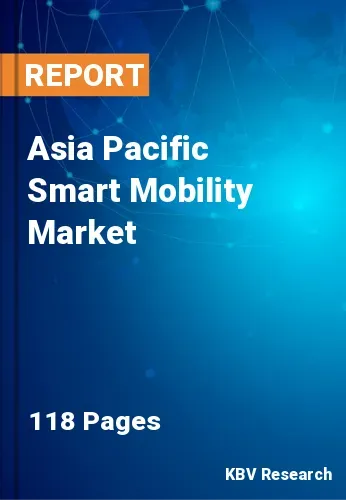The Asia Pacific Smart Mobility Market would witness market growth of 19.1% CAGR during the forecast period (2020-2026). The advent and rising popularity of dynamic, smart mobility services provide promising new opportunities for creating more effective use of current infrastructure. At a very low cost as compared to building the roads, smart mobility ecosystems can aid in lowering down the gridlock, reduce accident rates, enhance air quality, and narrow down the urban footprint needed for parking. Rising demand for ridesharing, bike commuting, and carsharing will bring considerable economic savings for the commuter as well as city planners.
Smart mobility has become a rising trend in response to the influences of transportation systems in cities. The concept of smart mobility has emerged majorly from the incorporation of digitalization within the transport industry. Therefore, advanced technologies have been utilized to enhance transport network efficiency, mainly those in terms of information and communication technology. The idea of smart mobility possesses the potential to manage various harmful effects of rapid urbanization as it is associated with the implementation of various useful modifications in the functioning of the city dynamics.
The current phase is thrilling for the mobility industry. There is a high increment in globalization & trade while novel mobility scenarios are emerging out of advanced technologies & market players. Simultaneously, an increasing focus on sustainability & environmental impact has created new limitations on the operations of players. Smart mobility is an ideal example of the Internet of Things (IoT) in which all means of transportation & user interfaces are capable to talk with one another using a network of wireless communications. With the help of this, citizens become capable to make better decisions about transportation while enhancing, reducing commute time, lowering down the negative effects of congestion, & optimizing productivity.
The China market dominated the Asia Pacific GPS Smart Mobility Market by Country in 2019, thereby, achieving a market value of $1,746.1 million by 2026. The Japan market is showcasing a CAGR of 18.7% during (2020 - 2026). Additionally, The India market is anticipated to witness a CAGR of 20.1% during (2020 - 2026).
Based on Element, the market is segmented into Ride Sharing, Car Sharing and Bike Commuting. Based on Solution, the market is segmented into Traffic Management, Parking Management, Mobility Management and Others. Based on Technology, the market is segmented into RFID, GPS, Embedded System, Wi-Fi, 3G & 4G and Others. Based on countries, the market is segmented into China, Japan, India, South Korea, Singapore, Malaysia, and Rest of Asia Pacific.
Free Valuable Insights: Smart Mobility Market in Asia Pacific is expected to register a CAGR of 19.1% during the forecast period (2020-2026)
The market research report covers the analysis of key stake holders of the market. Key companies profiled in the report include Cisco Systems, Inc., Ford Motor Company, Robert Bosch GmbH, Siemens AG, TomTom N.V., Toyota Motor Corporation, Excelfore Corporation, Innoviz Technologies, Ltd., Thales Group S.A., and MaaS Global Oy.
By Element
By Solution
By Technology
By Country

Our team of dedicated experts can provide you with attractive expansion opportunities for your business.

